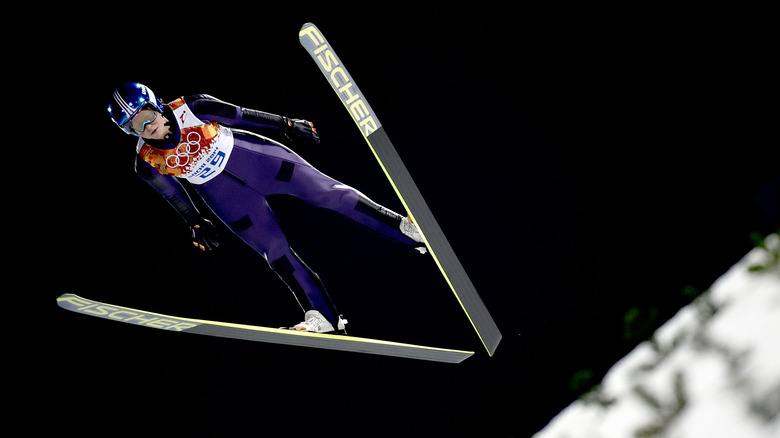Women Weren't Allowed To Compete In This Winter Olympics Sport Until 2014
The first modern Olympic Games were held on April 6, 1896, in Athens, Greece, and back then, only male athletes were allowed to compete. It wasn't until the 1900 Olympics that women were welcomed, but even then, they only had the option to participate in three sports — sailing, golf, and tennis, per BuzzFeed. Throughout the years, more sports welcomed female athletes including rowing, judo, and wrestling, among others.
Ski jumping is one of the sports that has been included in the Winter Olympics for decades, but it was only in 2014 when women were allowed to compete. It debuted at the 1924 Winter Olympic Games that were held in Chamonix, France. In ski jumping, athletes ski off a ramp and attempt to have a successful landing as close as they can to the K line — the point that designates the steepest point of the hill and where it flattens out (via Rules of Sport). Judges score the athletes based on their style and how close they land to the K line.
According to IOC, ski jumping wasn't open to women in the past as there were too few competitors. However, there was a bigger reason behind it.
Why weren't women allowed to compete in ski jumping before 2014?
One of the reasons why women weren't allowed in ski jumping events in the Winter Olympics had something to do with health. Female skiers have been campaigning for years before they were allowed to compete. Gian Franco Kasper of the International Ski Federation thinks that women's bodies are not made for ski jumping. "Don't forget it's like jumping down from, let's say, about two meters on the ground about a thousand times a year, which seems not to be appropriate for ladies from a medical point of view," he said, per NPR. This line of thinking goes way back to the Victorian era when the common belief was that extreme physical activity can ruin a woman's uterus and ovaries. Of course, we know now that it isn't true.
Kasper's statement was controversial, and ski jumper Lindsey Van voiced her opinion on the matter. "I'm sorry, but my baby-making organs are on the inside. Men have an organ on the outside. So if it's not safe for me jumping down, then my uterus is going to fall out, what about the organ on the outside of the body?" (via Business Insider).
Of course, the IOC has never declared health issues as a reason for not allowing women to compete in ski jumping. All that was said was that there were few women competitors to make it into an event. The sport was finally opened to women in 2014, and German athlete Carina Vogt (pictured above) was the first woman to earn the gold medal for ski jumping.

